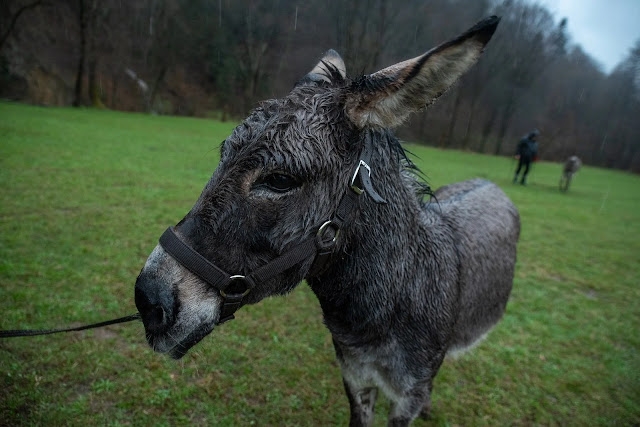EO
For the first two-thirds of 2022's EO, I was convinced I was viewing a modern day classic. That term seems to be an oxymoron anymore. Yet Jerzy Skolimowski, who co-wrote and directed, achieved a certain spell, one that was hugely emotional. Especially for me, an animal lover whose tolerance of cruelty toward them in movies has whittled down considerably. I have avoided films that I've heard feature such violence, regardless of whether it is allegedly thematically appropriate. The early moments in Skolimowski's film pulse with energy and color, punctuating heartfelt and even suspenseful scenes of a donkey wandering through Europe. A "road movie" where our friend discovers that not all humans are like the sweet young woman who trained and performed with him in a circus, one that was shut down when animal activists convinced local authorities to take action.
Eo wanders through forests and urban landscapes, picked up by farmers, wildlife control, and drifters at various times, but always eventually escaping. Perhaps to (again) reunite with said young lady Kasandra (Sandra Drzymalska)? What drives our cute protagonist? The credits inform us that Eo was played by six donkeys, and all of them are excellent actors, remarkably exhibiting emotion through facial expressions and body language. Their loud brays alone are heartbreaking, evoking an unbearable loneliness. Many viewers will be reminded of themselves in their lowest, most isolated moments.
Most of the folks Eo encounters are friendly enough to him, save a gang of football hooligans who blame him for their loss of a game winning goal. Some potent commentary on nationalism to be found here. I'd heard about this scene beforehand, and thankfully it is brief and from the point of view of Eo; we do not see unwatchable brutality. We do see the results of it.
We'll learn that some of the others Eo meets are also far from upstanding. And ultimately less interesting than the donkey. The third act of EO bafflingly introduces several characters and plotlines that derail the hypnotic journey, that distract us from Eo's wanderings. Some analysis of these scenes will reveal themes of religious hypocrisy, fate/karma, arbitrariness, racism, maybe "no good deed goes unpunished", but to me they were unnecessary. By my estimation, the film begins to falter when Eo kicks a man unconscious, the one who was wheeling him to be euthanized (a cheer worthy bit, it must be said). By the time a character played by Isabelle Huppert is smashing dishes in a kitchen, the earlier momentum of what had promised to be a magical odyssey was all but lost.
I mentioned the director's style, which at times is raucous and color saturated. One sped up point of view shot through the woods appears as if Skolimowski was paying tribute to Stanley Kubrick (or maybe Sami Raimi). This method ran hot and cold for me, an effort to be contemporary, to distinguish this film from inevitable comparisons to Bresson's AU HASARD BALTHAZAR. A quiet, nearly wordless film would've been far more effective and poetic. One of the most shattering moments features a wolf that lies suffering from a hunter's bullet as Eo mournfully yet resignedly looks on.
Nonetheless, EO is a significant achievement, a potent cry for animal rights. The final scene is frustratingly abrupt, but realistic and drives (whatever the myriad of interpretations you have for it) the not so murky thesis home.



Comments